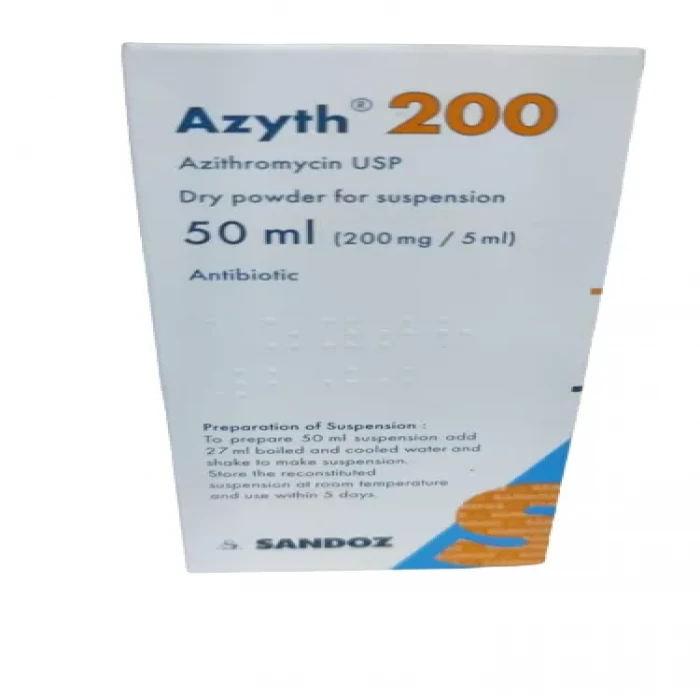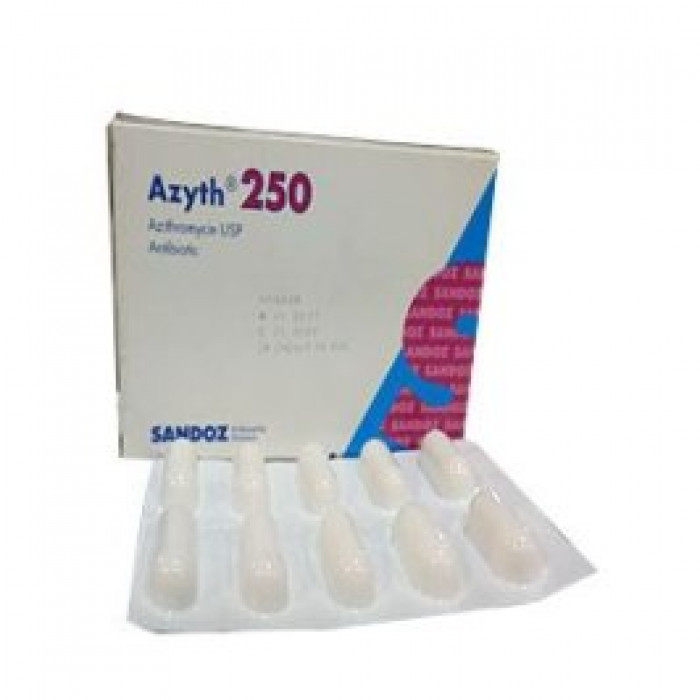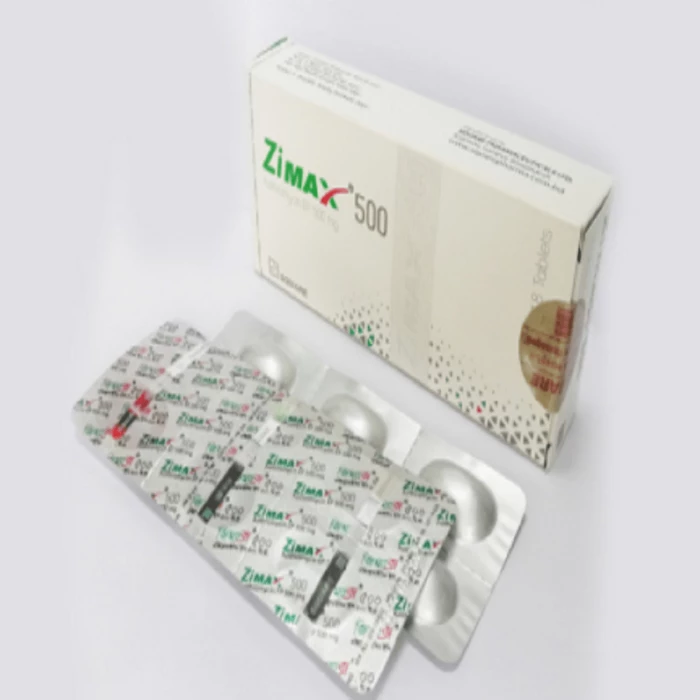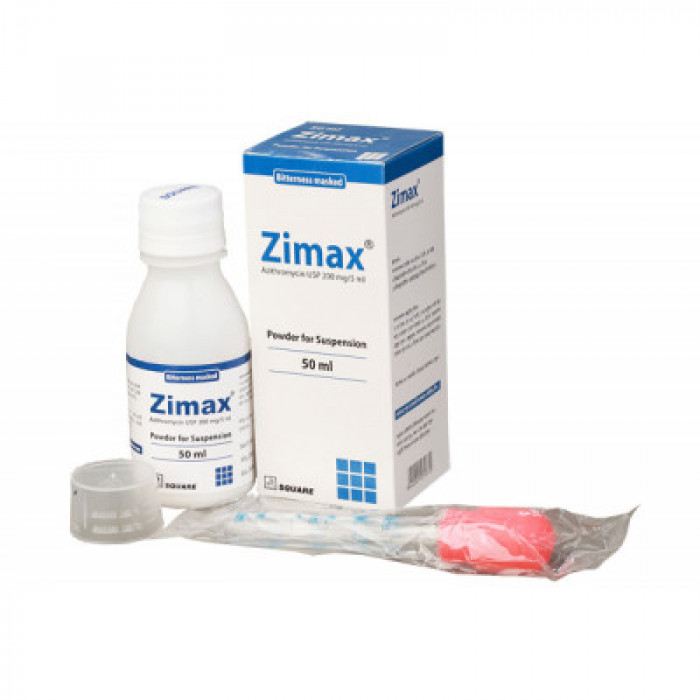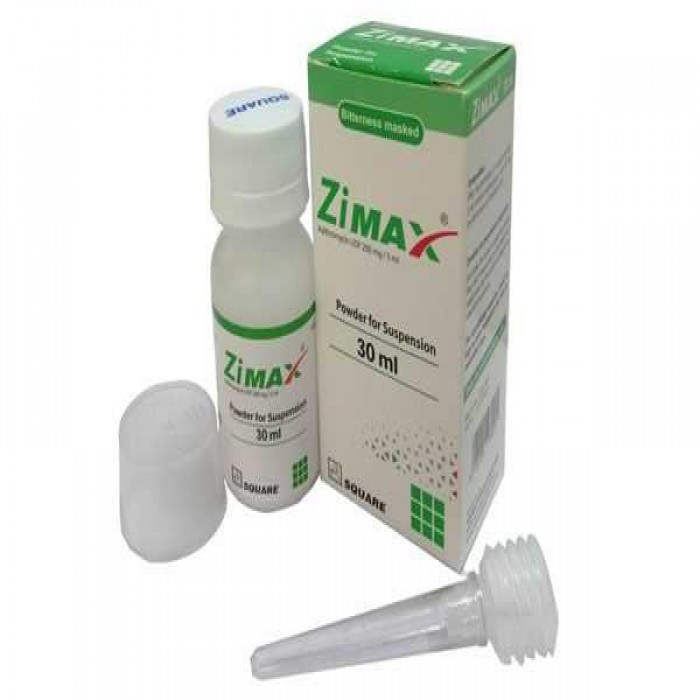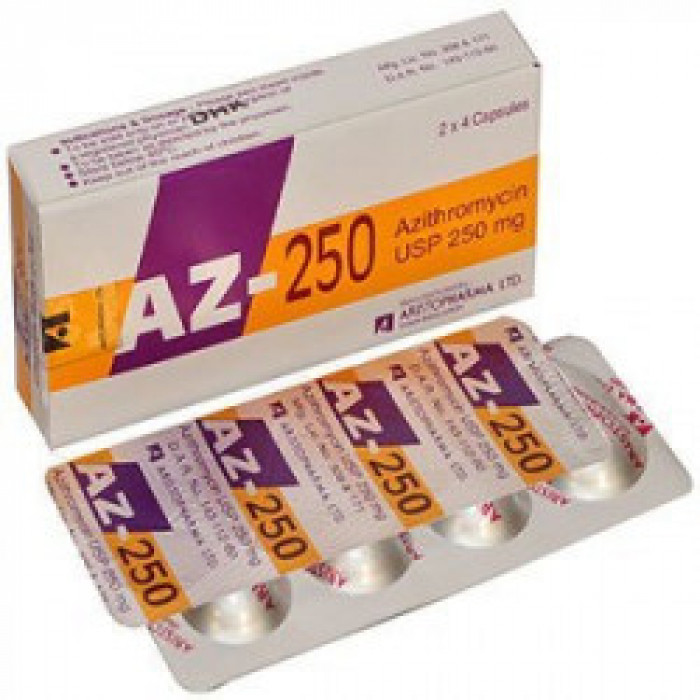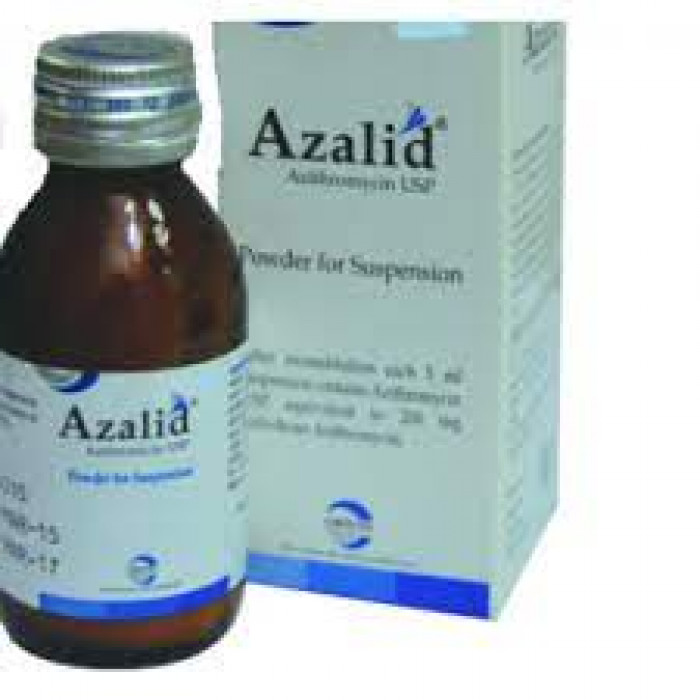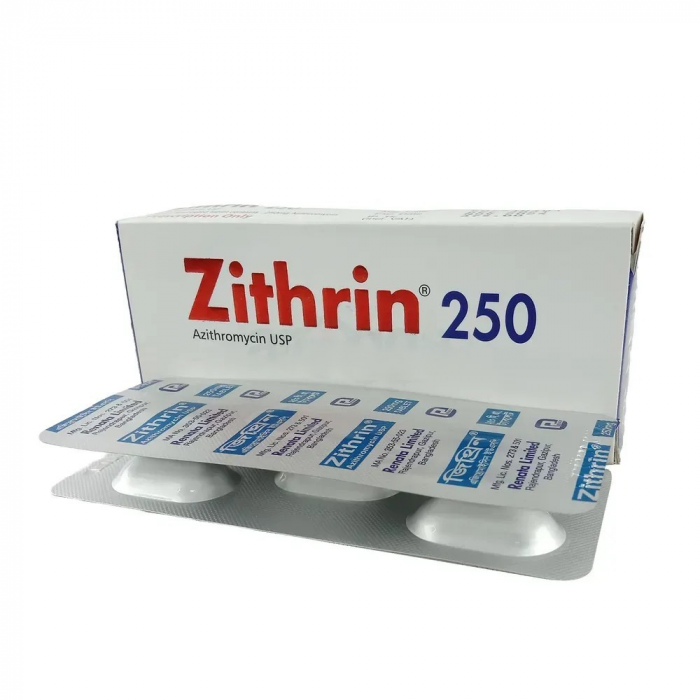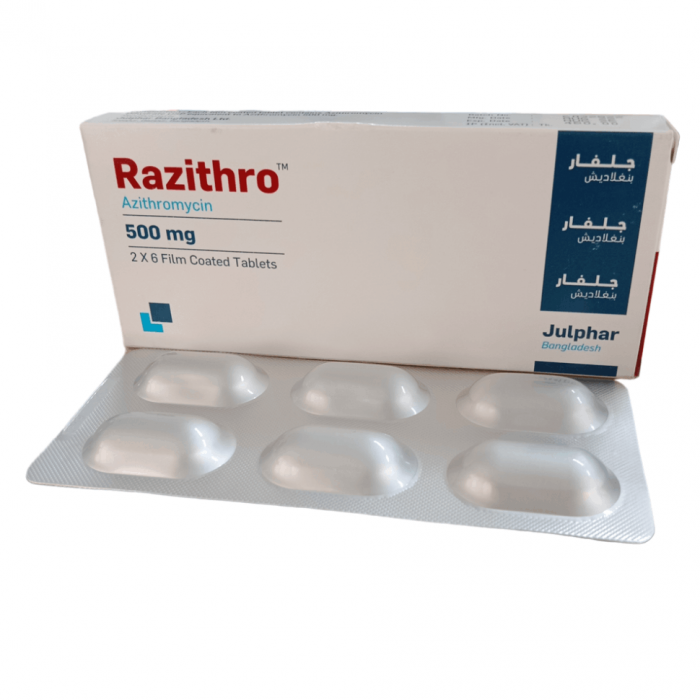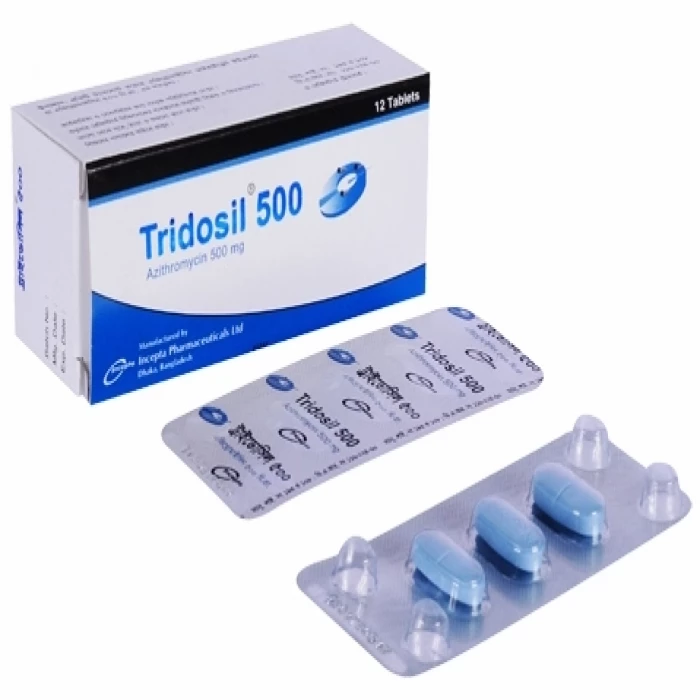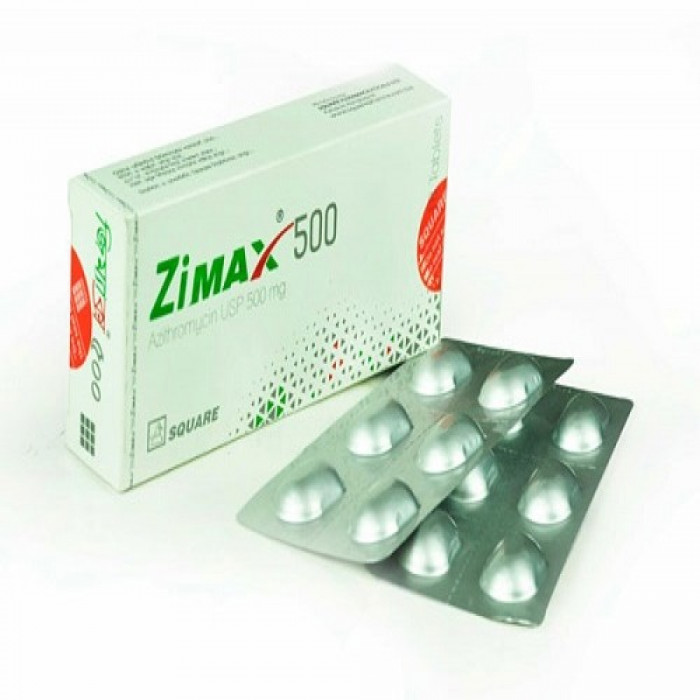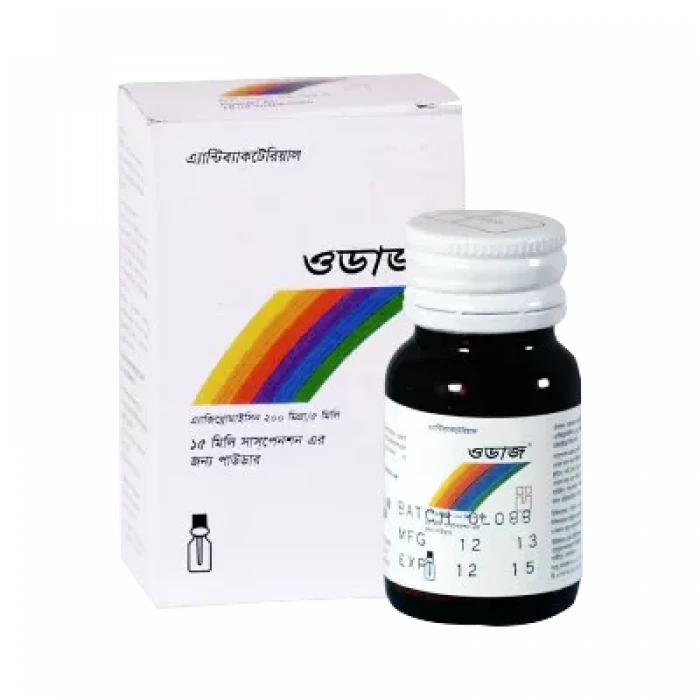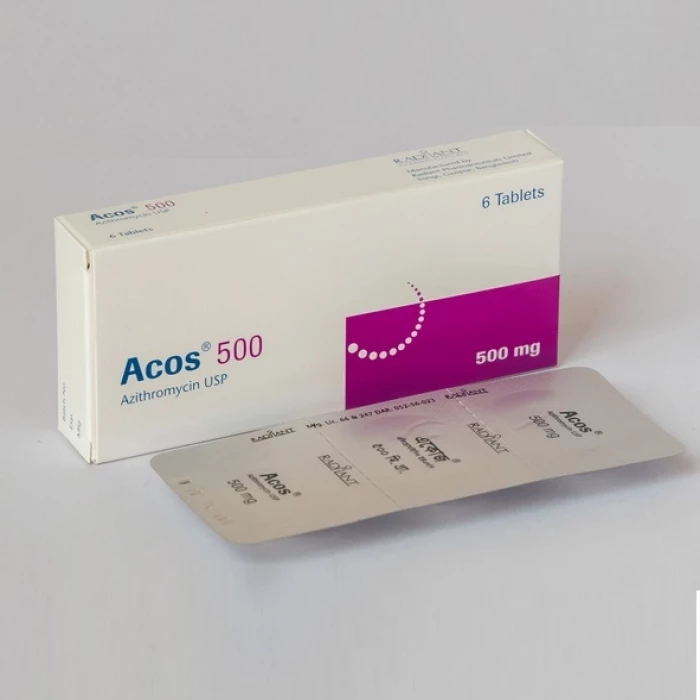
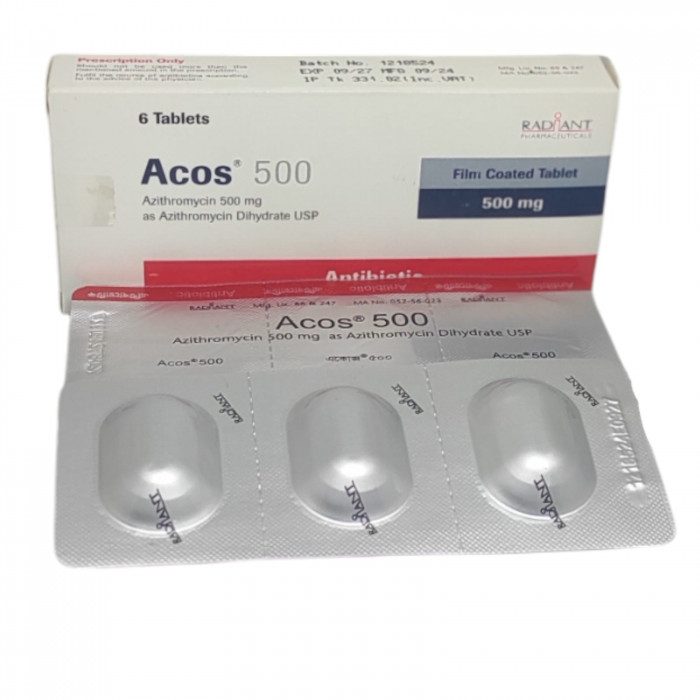
✔ 100% Authentic Product
👁️ Currently Viewing 5190
Acos 500mg Tablet 1 Strip
Azithromycin is used in the treatment of Bacterial infections. It is used in bacterial infections of the tonsils, sinus, ear, nose, throat, skin and soft tissues, and lungs (pneumonia).
Discount
Price: ৳ 162
MRP:
৳
165.5
2%
Off

100% Genuine Products, Guaranteed

Safe & Secure Payments, Always

Fast, Secure & Efficient Delivery

Proper Packaging
 Cash on Delivery - All over Bangladesh
Cash on Delivery - All over Bangladesh Regular Delivery - 12-24 Hours, Dhaka City* Charge Tk.39-59
Regular Delivery - 12-24 Hours, Dhaka City* Charge Tk.39-59 Regular Delivery - 24-48 Hours, Other Cities* Charge Tk.99-110
Regular Delivery - 24-48 Hours, Other Cities* Charge Tk.99-110
 ফ্রি ডেলিভারিঃ - ৯৯৯ টাকা+ অর্ডারে, ঢাকা
শহরে
ফ্রি ডেলিভারিঃ - ৯৯৯ টাকা+ অর্ডারে, ঢাকা
শহরে ফ্রি ডেলিভারিঃ - ২৯৯৯ টাকা+ অর্ডারে, ঢাকার
বাহিরে
ফ্রি ডেলিভারিঃ - ২৯৯৯ টাকা+ অর্ডারে, ঢাকার
বাহিরে
100% Genuine Products, Guaranteed
Safe & Secure Payments, Always
Fast, Secure & Efficient Delivery
Proper Packaging
 Cash on Delivery - All over Bangladesh
Cash on Delivery - All over Bangladesh Regular Delivery - 12-24 Hours, Dhaka City* Charge Tk.39-59
Regular Delivery - 12-24 Hours, Dhaka City* Charge Tk.39-59 Regular Delivery - 24-48 Hours, Other Cities* Charge Tk.99-110
Regular Delivery - 24-48 Hours, Other Cities* Charge Tk.99-110 ফ্রি ডেলিভারিঃ - ৯৯৯ টাকা+ অর্ডারে, ঢাকা
শহরে
ফ্রি ডেলিভারিঃ - ৯৯৯ টাকা+ অর্ডারে, ঢাকা
শহরে ফ্রি ডেলিভারিঃ - ২৯৯৯ টাকা+ অর্ডারে, ঢাকার
বাহিরে
ফ্রি ডেলিভারিঃ - ২৯৯৯ টাকা+ অর্ডারে, ঢাকার
বাহিরে
✅ Description:
Acos 500mg Tablet is a macrolide antibiotic used to treat various bacterial infections in the respiratory system, skin, ears, and sexually transmitted infections. It works by inhibiting the production of proteins required by bacteria for their survival.
Here are some key points to remember:
- Acos 500mg tablets should only be taken if prescribed by your doctor.
- It can be taken with or without food, but it is best to take it at a fixed time for consistent results.
- Do not exceed the recommended dose to avoid potential side effects.
- Complete the full course of treatment even if you start feeling better, as stopping early can lead to antibiotic resistance.
- Common side effects may include diarrhea, nausea, vomiting, and indigestion. Allergic reactions are rare but can occur. Seek medical attention if severe allergic reactions occur.
- Inform your doctor if you have liver problems, muscle problems (myasthenia gravis), heart rhythm disorders (arrhythmia), or electrolyte imbalances (low potassium or magnesium levels).
- If you experience diarrhea for more than four days, consult your doctor before taking any anti-diarrheal medication.
- The safety of Acos 500mg Tablet during pregnancy and breastfeeding is uncertain, so it is recommended to consult a doctor before use in these conditions.
- Use caution in elderly patients (above 65 years) and follow the doctor's advice.
- Avoid excessive sun exposure as Acos 500mg Tablet may increase sensitivity to sunlight. Use protective clothing and sunscreen with a high SPF when outdoors.
Safety Advices

Alcohol
CONSULT YOUR DOCTOR
Interaction with alcohol is unknown. It is advisable to consult your doctor before consumption.

Pregnancy
UNSAFE
There is insufficient information available about the use of Acos 500mg Tablet during pregnancy. Therefore you should not use Acos 500mg Tablet during pregnancy unless explicitly advised by your doctor.

Breastfeeding
UNSAFE
Acos 500mg Tablet 5's is partially passed through the mother’s milk, therefore it should not be used if you are breastfeeding.

Driving
CAUTION
The side effects of Acos 500mg Tablet can be adverse and when facing the same, driving should be completely avoided.

Kidney
CONSULT YOUR DOCTOR
Caution must be taken while taking this medication in patients with kidney disease. Adjustment of the dose is required, thus consult your doctor before taking Acos 500mg Tablet.

Liver
UNSAFE
Acos 500mg Tablet should be avoided if the person is suffering from any type of liver disease.
✔️ Uses of Acos 500mg Tablet
- Treatment of Bacterial Infections
✔️ How does Acos 500mg Tablet work?
Acos 500mg Tablet is a bacteriostatic drug, which means it slows down or inhibits the growth and reproduction of bacteria. It achieves this by binding to the 50S ribosomal subunits of susceptible microorganisms, thereby interfering with protein synthesis. This disruption in protein synthesis impairs the ability of the bacteria to function and reproduce effectively, leading to their inhibition and eventual elimination by the body's immune system.
✔️ Side Effects of Acos 500mg Tablet
- Diarrhea
- Abdominal Pain
- Vomiting
- Fever
- Nausea
- Headache
- Dizziness
- Rash
- Angioedema
- Ototoxicity
- Allergic Reaction
✔️ Words of Advice:
- Acos 500mg Tablet is an antibiotic used for the treatment of bacterial infections of the chest, nose, throat, ear, skin, soft tissue, and certain sexually transmitted infections. It should not be used for treating any other condition unless specified by the doctor.
- You should always complete the entire course of treatment with antibiotics as prescribed by your doctor. Do not miss any dose and do not take more than the prescribed dose.
- Before starting Acos 500mg Tablet, inform your doctor if you are pregnant, planning on becoming pregnant, or breastfeeding.
- Also, inform your doctor about all other medicines that you take and your complete medical history. Take it 1 hour before or two hours after food.
- Do not take antacids 2 hours before or after taking Azithromycin.
- Do not take any medicine on your own without confirming with your doctor during treatment with Acos 500mg Tablet. Antacids should be taken at least 1 hour before or 2 hours after the antibiotic.
- Diarrhea, abdominal pain, nausea, and wind (flatulence) can occur as side effects of this medicine. Inform your doctor if the side effects do not resolve even after completing the antibiotic course.
✔️ Indication of Acos 500
Acos 500mg Tablet is used to treat a variety of mild to moderate susceptible infections caused by bacteria and other microorganisms. Some of the conditions it can treat include:
- Chest, throat, and nasal infections: Acos 500mg Tablet is effective in treating infections such as bronchitis, pneumonia, tonsillitis, sore throat, and sinusitis.
- Ear infections: It is used to treat infections of the middle ear (acute otitis media) caused by bacteria.
- Skin and soft tissue infections: Acos 500mg Tablet can be used to treat skin and soft tissue infections, including abscesses and boils, caused by certain bacteria.
- Sexually transmitted diseases: It is effective in treating cervicitis, which is inflammation of the cervix, caused by bacteria such as Chlamydia trachomatis or Neisseria gonorrhea.
- Community-acquired pneumonia: Acos 500mg Tablet is used to treat pneumonia that is acquired outside the hospital. It can be effective against bacterial causes of pneumonia such as Haemophilus influenzae, Mycoplasma pneumoniae, and Streptococcus pneumoniae.
- Urethritis and Cervicitis: Urethritis, inflammation of the urethra, and cervicitis, inflammation of the cervix, can be treated with Acos 500mg Tablet when caused by Chlamydia trachomatis or Neisseria gonorrhoeae bacteria.
- Pharyngitis/Tonsillitis: It is used to treat infections affecting the throat and tonsils, such as pharyngitis, tonsillitis, and pharyngotonsillitis.
- Sinusitis: Acos 500mg Tablet can be effective in treating bacterial sinusitis, which is the swelling of the sinuses located behind the nose, cheekbones, and forehead.
- Bronchitis: It is used to treat bacterial bronchitis, which is the inflammation of the bronchial tubes that carry air to and from the lungs.
✔️ Pharmacology
Azithromycin, the active ingredient in Acos 500mg Tablet, acts by binding to the 50S ribosomal subunit of susceptible microorganisms, thereby interfering with microbial protein synthesis. It does not affect nucleic acid synthesis. The medication has demonstrated activity against various microorganisms, both in vitro and in clinical infections. These include:
Aerobic and facultative gram-positive microorganisms:
- Staphylococcus aureus
- Streptococcus agalactiae
- Streptococcus pneumoniae
- Streptococcus pyogenes
- Streptococci (Groups C, F, G)
- Viridans group streptococci
Aerobic and facultative gram-negative microorganisms:
- Haemophilus ducreyi
- Haemophilus influenzae
- Moraxella catarrhalis
- Neisseria gonorrhoeae
- Bordetella pertussis
- Legionella pneumophila
Other microorganisms:
- Chlamydia pneumoniae
- Chlamydia trachomatis
- Mycoplasma pneumoniae
✔️ Dosage & Administration of Acos 500mg Tablet
Here are the recommended dosage guidelines for Acos 500mg Tablet:
Oral administration in adults:
- For respiratory system bacterial infections, skin infections, ear infections, and sexually transmitted infections: Take 500 mg once daily orally for 3 days, or take 500 mg on day 1 followed by 250 mg once daily for the next 4 days.
- For sexually transmitted diseases caused by Chlamydia trachomatis: Take 1 gm as a single dose or 500 mg on day 1 followed by 250 mg once daily for the next 2 days.
Oral administration in children:
- For children over 6 months: Take 10 mg/kg body weight once daily for 3 days.
- Specific doses based on body weight:
- If body weight is 15-25 kg: Take 200 mg (1 teaspoonful) for 3 days.
- If body weight is 26-35 kg: Take 300 mg (1½ teaspoonfuls) for 3 days.
- If body weight is 36-45 kg: Take 400 mg (2 teaspoonfuls) for 3 days.
For typhoid fever: Take 500 mg (2½ teaspoonfuls) once daily for 7-10 days.
Azithromycin Injection (For IV Infusion only):
- Community-acquired pneumonia: Administer 500 mg as a single daily dose intravenously for at least two days. Switch to oral therapy with 500 mg once daily (administered as two 250-mg tablets) to complete a 7 to 10-day course of treatment.
- Pelvic inflammatory disease: Administer 500 mg as a single daily dose intravenously for one or two days. Switch to oral therapy with 250 mg once daily to complete a 7-day course of treatment.
It is important to follow your physician's advice regarding the correct dose and duration of treatment based on your age, body weight, and specific disease condition. Take the medicine with a glass of water and do not crush or chew it. The safety and effectiveness of Azithromycin for injection in children or adolescents under 16 years have not been established.
✔️ Interaction
Interaction with Alcohol: The interaction between Acos 500mg Tablet and alcohol is unknown. It is advisable to consult your doctor before consuming alcohol while taking this medication.
Interaction with Lab Tests: Monitoring of liver function tests and complete blood count (CBC) with differential may be necessary while taking this medicine.
Interaction with Other Medications: Acos 500mg Tablet may inhibit the CYP3A3/4 enzyme, which can affect the metabolism of certain drugs. It can also increase the levels of medications such as tacrolimus, phenytoin, ergot alkaloids, alfentanil, astemizole, terfenadine, bromocriptine, carbamazepine, cyclosporine, digoxin, disopyramide, and triazolam. However, Azithromycin did not affect the response to warfarin or theophylline. Caution is advised when administering these medications together.
Interaction with Specific Diseases: Acos 500mg Tablet may have interactions with certain diseases such as QT prolongation, liver disease, and myasthenia gravis. It is important to inform your doctor if you have any of these conditions before taking the medication.
Use in Patients with Hepatic Dysfunction: Acos 500mg Tablet should be used with caution in patients with hepatic dysfunction, as it may cause liver impairment. Symptoms such as malaise, nausea, vomiting, abdominal colic, and fever may occur, and if they do, the use of the medication should be discontinued.
Masking Symptoms of Infections: Acos 500mg Tablet may mask or delay the symptoms of incubating gonorrhea or syphilis. Therefore, appropriate culture and susceptibility tests should be performed before initiating the medication.
Pseudomembranous Colitis: There have been reports of pseudomembranous colitis associated with the use of macrolide antibiotics, including Acos 500mg Tablet. If you experience severe diarrhea while taking this medication, inform your doctor.
Interaction with Food: The rate and extent of gastrointestinal absorption of Acos 500mg Tablet may be decreased when taken with food. It is recommended to take this medicine on an empty stomach for optimal absorption.
Remember to always follow your doctor's instructions and inform them about any other medications or health conditions you have to avoid potential interactions and ensure the safe and effective use of Acos 500mg Tablet.
✔️ Contraindications
Acos 500mg Tablet is contraindicated in patients hypersensitive to Azithromycin or any other macrolide antibiotic. Co-administration of ergot derivatives and Azithromycin is contraindicated. Acos 500 mg Tablet is contraindicated in patients with hepatic diseases.
✔️ Pregnancy & Lactation
Azithromycin, the active ingredient in Acos 500mg Tablet, is classified as Pregnancy Category B. Animal studies have not shown evidence of harm to the fetus, but there are no adequate and well-controlled studies in pregnant women. Therefore, the use of Acos 500 mg Tablet during pregnancy should be considered only if there are no suitable alternatives available.
The presence of Azithromycin in breast milk is not known. Caution should be exercised when Acos 500 mg Tablet is administered to nursing women. It is important to weigh the potential benefits of treatment with Azithromycin against any potential risks to the breastfeeding infant. Women should monitor their breastfed infants for any signs of adverse effects such as diarrhea, vomiting, or rash.
✔️ Precautions & Warnings
- Before taking Acos 500mg Tablet it is important to inform your doctor if you have any liver problems such as jaundice, muscle problems like myasthenia gravis, heart rhythm disorder like arrhythmia, or electrolyte imbalance with low potassium or magnesium levels. In rare cases, Acos 500mg Tablet may cause diarrhea, and if you experience watery or bloody diarrhea, you should stop taking the medication and contact your doctor. However, do not take any anti-diarrheal medicine without your doctor's advice.
- The potential harm of Acos 500mg Tablet to a baby during pregnancy is unknown. If you are pregnant, planning for pregnancy, or breastfeeding, it is important to consult your doctor before using Acos 500mg Tablet. If you are allergic to azithromycin or other macrolide antibiotics, you should not take Acos 500mg Tablet.
- Inform your doctor if you are using cholesterol-lowering drugs (statins like simvastatin, lovastatin, etc.), anti-gout or anti-arthritis drugs (colchicine), or medication for treating overactive bladder (tolterodine) as they may interact with Acos 500mg Tablet.
- Acos 500mg Tablet is not recommended for patients with pneumonia who are deemed inappropriate for oral therapy due to moderate to severe illness or risk factors.
- There is a potential risk of Torsades de pointes and fatal heart arrhythmias associated with Acos 500mg Tablet use in patients with prolonged QT interval, low potassium or magnesium levels, slow heart rate, and those taking medications for treating abnormal heart rhythms. Caution should be exercised in patients with impaired liver and kidney function.
- During lactation, it is unknown whether the drug is excreted into breast milk, so caution should be exercised when using Acos 500mg Tablet while breastfeeding.
- Monitoring of liver function tests and complete blood count with differential may be recommended during treatment with Acos 500mg Tablet.
✔️ Storage Conditions
Store Acos 500mg Tablets at room temperature in a cool and dry place. Keep out of the reach of children & pets.
⚠️Disclaimer:
At ePharma, we’re committed to providing accurate and accessible health information. However, all content is intended for informational purposes only and should not replace medical advice from a qualified physician. Please consult your healthcare provider for personalized guidance. We aim to support, not substitute, the doctor-patient relationship.




